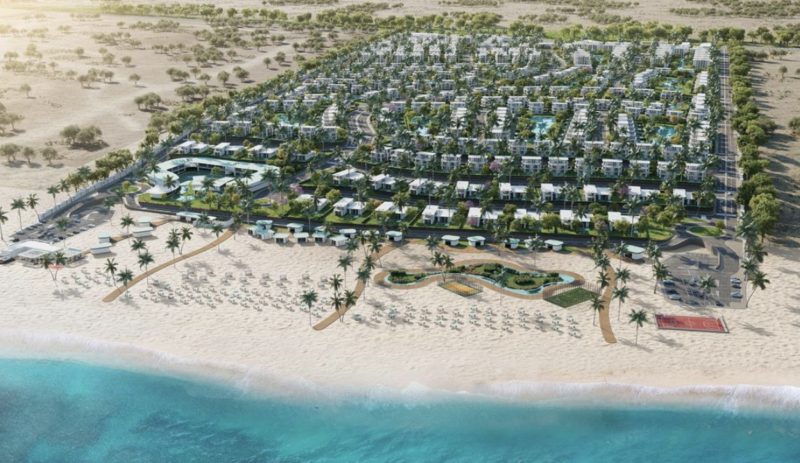
White sand, turquoise water and chic hotels: The seaside resort of Ras al-Hikma, 350 kilometers northwest of Cairo, evokes the growing portfolio of luxury resorts in Egypt, in which the United Arab Emirates is emerging as a major potential investor.
Abu Dhabi is set to take a colossal step in this direction soon, acquiring 80 percent of the territory, which covers 180 million square meters on the shores of the Mediterranean.
An Egyptian official declared on Feb. 7 that an Emirati consortium had been selected to buy the land and manage the tourism development of Ras al-Hikma. Scheduled for completion by 2050, it is a project that President Abdel Fattah al-Sissi's government included in its major urban development plan for the northwest coast.
In an interview with CNBC Arabia on Feb. 8, Director General of the Egyptian General Authority for Investment and Free Zones Hossam Heiba estimated the project at $22 billion, noting that a deal was in process without providing further details on the companies involved. The Egyptian newspaper Ahram reported a tourism project including an airport, hotels, shopping malls and residential complexes.
Currency devaluation
Egypt is expected to retain a 20 percent stake in Ras al-Hikma, according to sources close to the negotiations, quoted by Bloomberg. This minority stake would be held in part by real estate developer Talaat Moustafa and certain Egyptian public entities, the news agency reports, adding that no final decision has been made.
For Cairo, the project appears to be a means of attracting foreign currency, at a time when the country is facing its worst foreign liquidity crisis in decades, with a new devaluation in sight — the fourth since 2022.
The injection of these funds would enable Egypt to readjust the black market rate of the pound, which has fallen by more than half against the dollar since last year, and satisfy importers' demand for greenbacks.
Abu Dhabi continues to support its Egyptian ally by taking a stake in this new government project, after having injected $5 billion into the central bank in 2022. However, the Gulf States, supporters of al-Sissi's regime, argued for the conditionality of aid to Cairo, demanding economic reforms in exchange for their investments. This position was in line with that of the International Monetary Fund (IMF), which called on the state and the army to withdraw from the economy or to introduce a floating exchange rate to obtain financing.
The Ras al-Hikma announcement came a week after the IMF, through the voice of its director Kristalina Georgieva, declared itself "very close" to a loan agreement with Egypt which, according to several media outlets, should reach $10 billion.
Criticism
Despite these tempting prospects, the project was not met with unanimous approval among Egyptians, who have taken to social networks to accuse the government of auctioning off the country's most beautiful beaches.
“Who gave Abdel Fattah al-Sissi the right to sell Ras al-Hikma? I mean, was it his mother's inheritance or his father's?" actor and filmmaker Amr Waked quipped on X.
On the same network, Hisham Sabry, a former security officer who is now a critic of the regime, called Ras al-Hikma "God's paradise on earth,” before exclaiming, "Sissi commits 250 accidents an hour!"
This is not the first time that Emirati companies bought up swathes of foreign territory, albeit for different purposes. In recent months, the private Emirati company Blue Carbon, established a year ago and headed by the son of Dubai’s Emir, has obtained a concession for one million hectares of forest in Liberia, i.e. 10 percent of the country's surface area. It also acquired 20 percent of the territory of Zimbabwe, i.e. roughly the size of the UK, to sell carbon credits to states wishing to keep their CO2 emissions below 2°C. This is a practice that raises questions both about the future of local forest populations, and about the conflicts of interest that could emerge from the company's ownership.
This article was originally published in L'Orient-Le Jour.